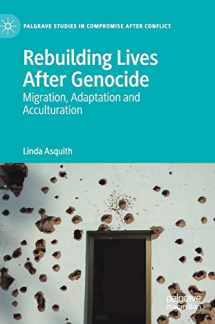
Rebuilding Lives After Genocide: Migration, Adaptation and Acculturation (Palgrave Studies in Compromise after Conflict)
ISBN-13:
9783030140731
ISBN-10:
3030140733
Edition:
1st ed. 2019
Author:
Linda Asquith
Publication date:
2019
Publisher:
Palgrave Macmillan
Format:
Hardcover
235 pages
Category:
Personality
,
Psychology & Counseling
,
Criminology
,
Social Sciences
,
Emigration & Immigration
,
Sociology
FREE US shipping
on ALL non-marketplace orders
Rent
35 days
Due Jun 12, 2024
35 days
from $53.54
USD
Marketplace
from $90.98
USD
Marketplace offers
Seller
Condition
Note
Seller
Condition
Used - Good
Book details
ISBN-13:
9783030140731
ISBN-10:
3030140733
Edition:
1st ed. 2019
Author:
Linda Asquith
Publication date:
2019
Publisher:
Palgrave Macmillan
Format:
Hardcover
235 pages
Category:
Personality
,
Psychology & Counseling
,
Criminology
,
Social Sciences
,
Emigration & Immigration
,
Sociology
Summary
Rebuilding Lives After Genocide: Migration, Adaptation and Acculturation (Palgrave Studies in Compromise after Conflict) (ISBN-13: 9783030140731 and ISBN-10: 3030140733), written by authors
Linda Asquith, was published by Palgrave Macmillan in 2019.
With an overall rating of 4.5 stars, it's a notable title among other
Personality
(Psychology & Counseling, Criminology, Social Sciences, Emigration & Immigration, Sociology) books. You can easily purchase or rent Rebuilding Lives After Genocide: Migration, Adaptation and Acculturation (Palgrave Studies in Compromise after Conflict) (Hardcover) from BooksRun,
along with many other new and used
Personality
books
and textbooks.
And, if you're looking to sell your copy, our current buyback offer is $0.3.
Description
This book examines how genocide survivors rebuild their lives following migration after genocide. Drawing on a mixture of in-depth interviews and published testimony, it utilises Bourdieu’s concept of social capital to highlight how individuals reconstruct their lives in a new country. The data comprises in-depth interviews with survivors of the Rwandan and Bosnian genocides, and the Holocaust. This combination of data allows for a broader analysis of the themes within the data. Overall, Rebuilding Lives After Genocide seeks to demonstrate that a constructivist, grounded theoretical approach to research can draw attention to experiences that have been hidden and unheard. The life of survivors in the wake of genocides is a neglected field, particularly in the context of migration and resettlement. Therefore, this book provides a unique insight into the debate surrounding recovery from victimisation and the intersection between migration and victimisation.


We would LOVE it if you could help us and other readers by reviewing the book
Book review

Congratulations! We have received your book review.
{user}
{createdAt}
by {truncated_author}


